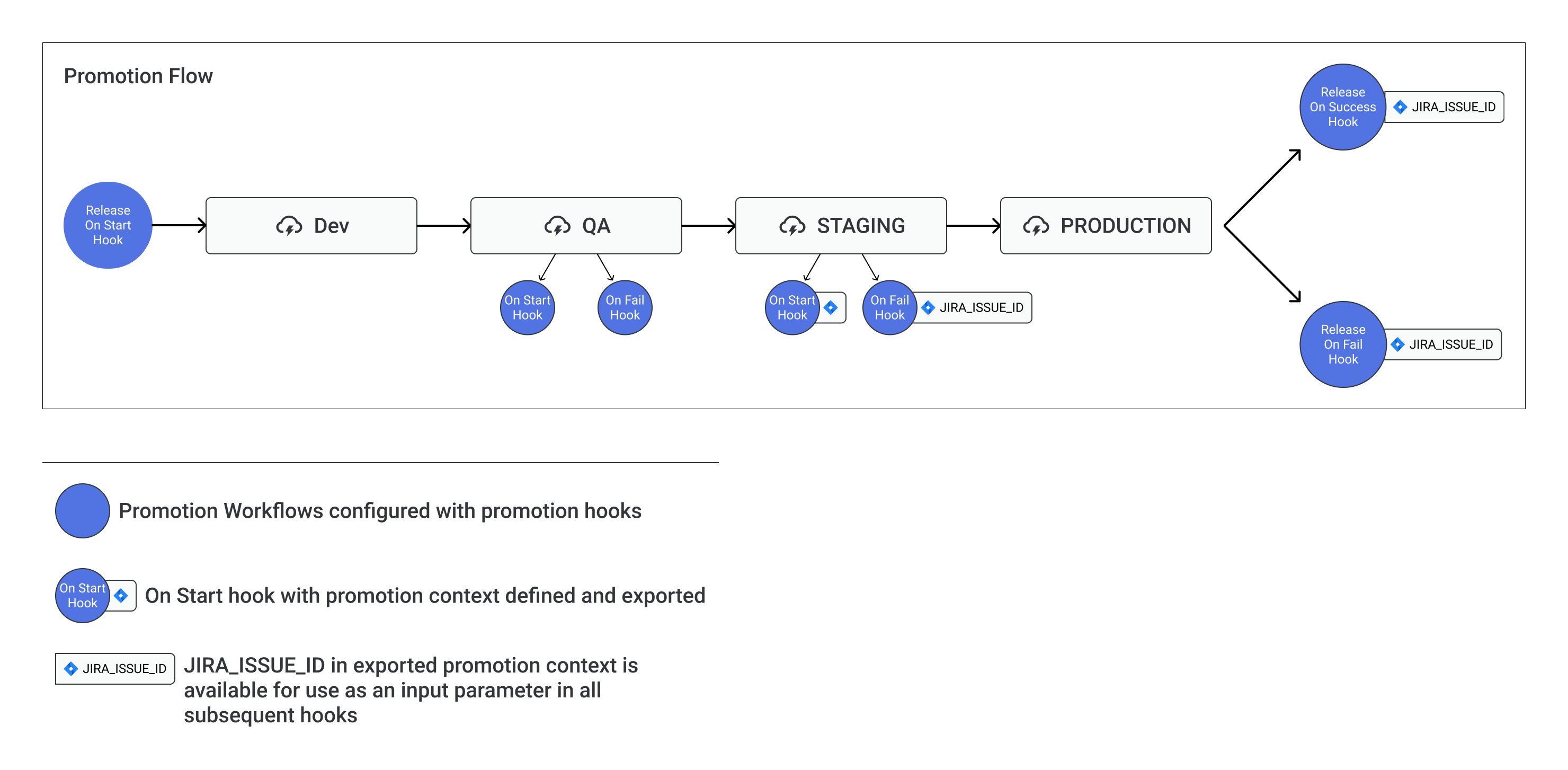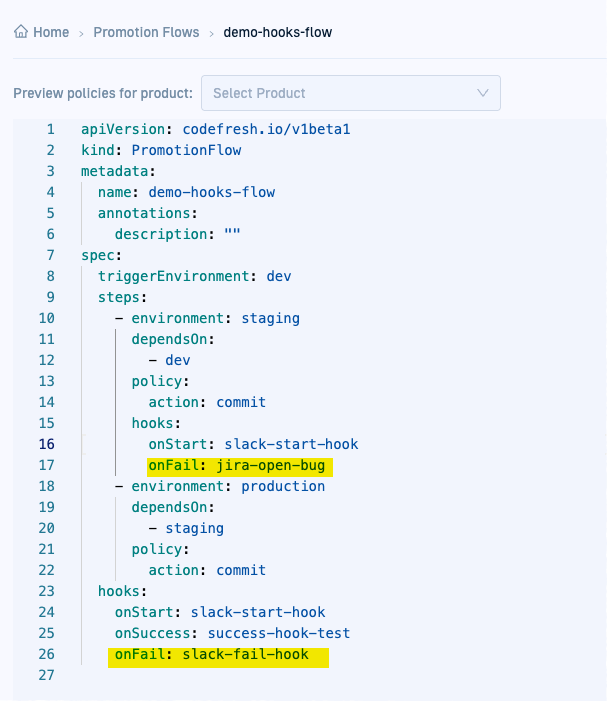Promotion contexts for promotion hooks
Use promotion contexts to expose custom parameters to hooks in Promotion Flows
Promotions is currently in development
This feature is still under active development and we’ve identified some issues with its resilience and reliability, particularly with recovery from cluster and network problems. We are currently upgrading our architecture to resolve these known issues and add self-healing capabilities. We don’t recommend using Promotions for mission-critical or production deployments at this time.
About promotion contexts
Promotion Workflows with hooks in Codefresh GitOps have access to a standard set of default parameters, such as the release ID, current release version, product, and commit SHA. When you define these parameters in the hook as input parameters, their values are dynamically retrieved from the ongoing promotion.
Because promotion hooks run within GitOps Runtimes in your own clusters, custom parameters such as Jira ticket IDs, approver names, or Slack channel names are not automatically exposed to the promotion process. To use these custom parameters in hooks, you have two options:
- Define the custom parameters and their values manually in the workflow
- Use a promotion context for a more flexible and dynamic approach
A promotion context is a user-defined JSON object that allows you to pass custom values between promotion hooks in the same Promotion Flow. See Creating and exporting a promotion context and Example of Promotion Workflow with promotion context.
Defining a promotion context with the custom parameters and then exporting the context makes these custom values available to all subsequent hooks in the same Promotion Flow. Each hook can access and use the values from the promotion context as needed.
Using promotion contexts enables scenarios like notifying specific Slack channels or linking Jira tickets to releases. See How promotion context works during execution.
To see a practical example, follow the Walkthrough: Using promotion hooks in Promotion Flows to handle promotion failures, where you create different Promotion Workflows with hooks, define a promotion context in a workflow, and assign hooks at different stages of the Promotion Flow.
Creating and exporting a promotion context
You can use any method to create a promotion context as a JSON object and define the parameters you need.
The key step is exporting the promotion context, as this makes its content available to the Promotion Workflow. The content is saved in the platform.
When you export the promotion context, name.outputs.parameters must be set to PROMOTION_CONTEXT and cannot be changed. See Example of Promotion Workflow with promotion context.
Example of Promotion Workflow with promotion context
The example creates a promotion context PROMOTION_CONTEXT as a JSON object and exports it as an output parameter.
- The promotion context defines
JIRA_ISSUE_SOURCE_FIELDandJIRA_BASE_URL - Writes the context to a file
/tmp/promotion-context.txt - Adds
PROMOTION_CONTEXTtooutputs.parameters.name, definesglobalNameas the name of the promotion context, and invalueFrom.pathspecifies the file path where the promotion context JSON was saved for GitOps Cloud to retrieve and pass on to subsequent Promotion Workflows.
...
spec:
...
- name: set-promotion-context
serviceAccountName: hook
inputs:
parameters:
- name: JIRA_ISSUE_SOURCE_FIELD
- name: JIRA_BASE_URL
script:
image: alpine
command:
- sh
source: |
export JIRA_ISSUE_BASE_URL=""
export JIRA_ISSUE_SOURCE_FIELD=""
PROMOTION_CONTEXT=$(echo "{\"JIRA_ISSUE_URL\": \"${JIRA_ISSUE_BASE_URL}/browse/${JIRA_ISSUE_SOURCE_FIELD}\"}")
echo "$PROMOTION_CONTEXT" > /tmp/promotion-context.txt
outputs:
parameters:
- name: PROMOTION_CONTEXT # cannot be changed
globalName: PROMOTION_CONTEXT # name of promotion context
valueFrom:
path: /tmp/promotion-context.txt
...
How promotion context works during execution
When a hook exports a promotion context, the promotion mechanism passes the parameters defined within the context to all subsequent hooks in the Promotion Flow. regardless of whether these hooks include promotion contexts. The promotion context is saved in the GitOps Cloud platform.
This ensures:
- Context values persist across environments and clusters
- If a hook redefines a parameter already in the context, the new value takes precedence
Triggering the first promotion hook
When the Promotion Flow is triggered and a product release is created, the promotion mechanism:
- Passes the default input parameters defined (release ID, commit SHA for example) to all hooks configured for the Promotion Flow
- Initializes the promotion context, if defined and exported, with custom values
Triggering subsequent promotion hooks
As the Flow progresses, the promotion mechanism:
- Retrieves the promotion context exported by the previous hook
- Passes the promotion context automatically to the next hook
- If the current hook defines one or more of the parameters from the promotion context as input parameters, their values are taken from the context
- If the current hook also exports a promotion context with the same parameter, the value from the current hook’s promotion context overrides the value from the previous context
Walkthrough: Using promotion hooks in Promotion Flows to handle promotion failures
Promotion hooks are designed to take action or provide information related to a release and its environments when a promotion is triggered. In this walkthrough, you’ll see how to create and export a promotion context, and create promotion hooks and use the promotion context to handle promotion failures, ensuring that stakeholders are notified with the right information—without needing to monitor the release manually.
This walkthrough covers:
- Creating a Promotion Workflow template with a generic promotion context
- Creating Promotion Workflows with hooks
- Assigning hooks in Promotion Flow
- Triggering hooks in Promotion Flow
Create Promotion Workflow template with generic promotion context
This Promotion Workflow template:
- Defines a generic promotion context as a key-value map in JSON format.
- Uses a single parameter,
context-params, which is a JSON string of arbitrary keys and values, such as metadata for the promotion, Jira ticket references, base URLs. - Exports the promotion context as
PROMOTION_CONTEXT, ensuring that it’s available to any promotion hook which references it.
Example YAML
apiVersion: argoproj.io/v1alpha1
kind: WorkflowTemplate
metadata:
name: set-promotion-context
annotations:
version: 0.0.1
codefresh.io/workflow-origin: promotion
spec:
entrypoint: generate-context
templates:
- name: generate-context
serviceAccountName: hook
inputs:
parameters:
- name: context-params
description: JSON string of key-value pairs
# Example: '{"JIRA_ISSUE_SOURCE_FIELD": "ABC-123", "JIRA_BASE_URL": "https://jira.example.com"}'
script:
image: alpine
command: [sh]
source: |
echo '' > /tmp/context.json
CONTEXT_JSON=$(cat /tmp/context.json)
# Output the context as is
echo "$CONTEXT_JSON" > /tmp/promotion-context.txt
outputs:
parameters:
- name: PROMOTION_CONTEXT
globalName: PROMOTION_CONTEXT
valueFrom:
path: /tmp/promotion-context.txt
Create Promotion Workflows with hooks
Hook 1: Create Jira ticket on promotion failure and export Jira issue URL through promotion context
This hook performs two main actions:
- Creates a Jira issue when a promotion fails.
- References the exports a promotion context that stores the URL of the created Jira issue, making it available to later hooks in the same Promotion Flow.
| Hook 1 feature | Description |
|---|---|
| Two-step DAG structure | The hook defines a Directed Acyclic Graph (DAG) with two steps: create-issue followed by set-promotion-context, which depends on successful Jira issue creation. |
| Jira issue creation | The create-issue step runs a container that creates a Jira issue and outputs its key or ID. |
| Referenced template | The set-promotion-context step uses a reusable WorkflowTemplate named set-promotion-context, referencing its generate-context template. |
| Promotion context setup | The set-promotion-context step passes a context-params JSON object with a dynamic Jira field value (JIRA_ISSUE_SOURCE_FIELD) from create-issue and a static base URL (JIRA_ISSUE_URL). It outputs this object as PROMOTION_CONTEXT. |
| Global sharing of context | The exported PROMOTION_CONTEXT is globally accessible to any subsequent hook in the Promotion Flow. |
Example YAML
apiVersion: argoproj.io/v1alpha1
kind: WorkflowTemplate
metadata:
name: jira-open-bug
annotations:
codefresh.io/workflow-origin: promotion
version: 0.0.1
spec:
serviceAccountName: hook
entrypoint: main-dag
templates:
- name: main-dag
dag:
tasks:
- name: create-issue
template: create-issue
- name: set-promotion-context
templateRef:
name: set-promotion-context
template: generate-context
depends: "create-issue.Succeeded"
arguments:
parameters:
- name: context-params
value: |
{
"JIRA_ISSUE_SOURCE_FIELD": "",
"JIRA_ISSUE_URL": "https://testjira273.atlassian.net"
}
- name: create-issue
serviceAccountName: hook
retryStrategy:
limit: "3"
retryPolicy: "Always"
backoff:
duration: "5s"
inputs:
parameters:
- name: SLACK_TOKEN
valueFrom:
secretKeyRef:
name: promotions-secrets
key: slack-token
- name: JIRA_ISSUE_URL
value: https://testjira273.atlassian.net
- name: JIRA_USERNAME
value: [email protected]
- name: JIRA_API_KEY_SECRET_KEY
default: 'api-key'
- name: JIRA_USERNAME_SECRET_KEY
default: 'username'
- name: ISSUE_PROJECT
default: 'TEST'
- name: ISSUE_SUMMARY
default: 'migration for product release failed'
- name: ISSUE_DESCRIPTION
default: 'fix migration and current db state'
- name: ISSUE_COMPONENTS
default: ''
- name: ISSUE_CUSTOMFIELDS
default: ''
- name: ISSUE_TYPE
default: 'Task'
outputs:
parameters:
- name: JIRA_ISSUE_SOURCE_FIELD
valueFrom:
path: /tmp/JIRA_ISSUE_SOURCE_FIELD
container:
name: main
imagePullPolicy: Always
image: quay.io/codefreshplugins/argo-hub-workflows-jira-versions-0.0.1-images-jira-manager:main
command:
- python
- /jira/jira_issue_manager.py
env:
- name: JIRA_BASE_URL
value: ''
- name: JIRA_USERNAME
value: ''
- name: JIRA_API_SECRET_KEY
value: ''
- name: ACTION
value: 'issue_create'
- name: ISSUE_PROJECT
value: ''
- name: ISSUE_SUMMARY
value: ''
- name: ISSUE_DESCRIPTION
value: ''
- name: ISSUE_COMPONENTS
value: ''
- name: ISSUE_CUSTOMFIELDS
value: ''
- name: ISSUE_TYPE
value: ''
volumeMounts:
- name: promotion-context
mountPath: /tmp
volumes:
- name: promotion-context
emptyDir: {}
Hook 2: Create a hook that sends a Slack notification
This hook sends a Slack notification when a promotion fails. It uses the promotion context set by the Jira creation hook to include a direct link to the Jira issue in the Slack message.
| Hook 2 feature | Description |
|---|---|
| Single-step notification flow | This hook uses a simple, single send-message template to post a Slack message. |
| Detailed Slack notification | The Slack message the includes product name, commit SHA, promotion flow name, release URL, release ID, failed environments, error message, and the Jira ticket URL. |
| Dynamic inputs | Parameters like PRODUCT_NAME, COMMIT_SHA, ERROR_MESSAGE, and JIRA_ISSUE_URL are passed dynamically, allowing the message to include real-time promotion failure details. |
| Simple and reusable Slack template | The hook uses a standard Slack webhook and a flexible SLACK_TEXT format, making it easy to modify for different products or flows without changing the container logic. |
| Promotion context usage | The JIRA_ISSUE_URL from the promotion context created in the previous hook is injected into the Slack message, linking the notification directly to the Jira ticket for tracking. |
Example YAML
apiVersion: argoproj.io/v1alpha1
kind: WorkflowTemplate
metadata:
name: slack-fail-hook
annotations:
codefresh.io/workflow-origin: promotion
version: 0.0.1
spec:
arguments:
parameters:
- name: RELEASE_URL
- name: PRODUCT_NAME
- name: COMMIT_SHA
- name: PROMOTION_FLOW_NAME
- name: RELEASE_ID
- name: FAILED_ENVIRONMENTS
value: '[]'
- name: ERROR_MESSAGE
- name: JIRA_ISSUE_URL
serviceAccountName: hook
entrypoint: send-message
templates:
- name: send-message
retryStrategy:
limit: "1"
retryPolicy: "Always"
backoff:
duration: "5s"
inputs:
parameters:
- name: MODE
value: "simple"
- name: SLACK_HOOK_URL
value: https://hooks.slack.com/services/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
- name: SLACK_TEXT
value: |
🚨 *Promotion Failed!* 🚨
*Product:*
*Trigger Commit Sha:*
*Promotion Flow:*
*Release:* <|View Release>
*Release ID:*
*Failed Environments:*
*Error Message:*
*JIRA Ticket:*
container:
name: main
imagePullPolicy: Always
image: quay.io/codefreshplugins/argo-hub-slack-send-message:0.0.2-main
command:
- node
- /usr/src/app/index.js
env:
- name: MODE
value: ''
- name: SLACK_HOOK_URL
value: ''
- name: SLACK_TEXT
value: ''
Assign hooks to Promotion Flow
The next step is to assign Hook 1 and Hook 2 to different stages of the Promotion Flow.
Here’s an example of the Chart and YAML views of a Promotion Flow with several promotion hooks assigned. The hooks relevant to the examples above are highlighted.
Result of triggering Hooks 1 and 2 work in the Promotion Flow
The table describes the results when the two hooks are triggered.
| Step | Action | |
|---|---|---|
| 1 | Promotion fails in staging environment |
Triggers On Failure hook configured for staging environment |
| 2 | On Failure Hook 1: jira-open-bug |
{::nomarkdown}<ol><li>Creates new Jira issue describing the release failure.</li><li>Defines a promotion context including the Jira issue URL</li><li>Exports the promotion context to all subsequent hooks in the Promotion Flow, including On Release Failure Hook 2: slack-fail-hook.</li></ul> |
| 3 | Promotion failure for environment triggers On Release Failure | Hook 2: slack-fail-hook sends a Slack notification to all stakeholders. The notification includes detailed failure information including the Jira issue URL value and other values available. |
Here’s an example of the Slack notification sent on release failure:
Related articles
Configure Promotion Workflows
Configure hooks in Promotion Workflows
Configure Promotion Flows



